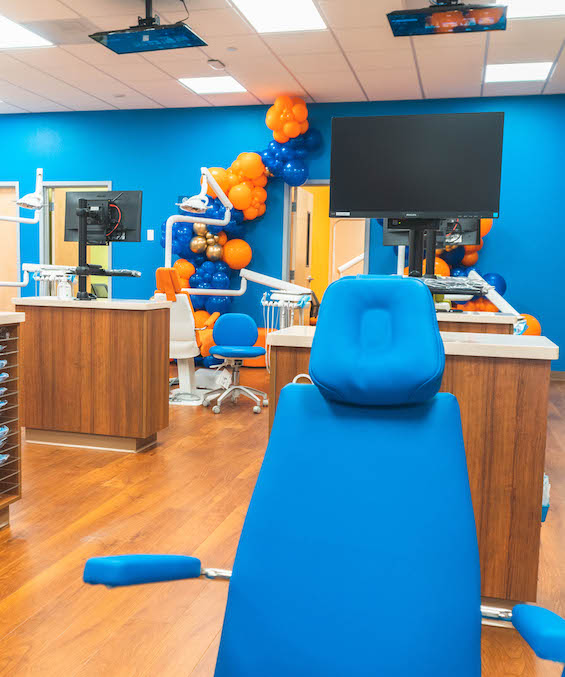¡Para Español, pulse aquí!

Orthodontics
We provide Orthodontic care in San Diego, CA. We know that choosing to receive orthodontic care is a big decision, and our Orthodontists respect your reasons for wanting to improve the way you look and feel.
Reasons for Braces
In most cases, teeth can be corrected by simply using the traditional type of metal braces. This also tends to be the most cost-effective method. This is why we use metal braces the most often. However, we do cater to our patients’ individual needs and concerns. If you would like information on using alternative types of braces don’t hesitate to ask us. We will be happy to explain our recommendations and thoroughly explore all options with you.
San Diego
Latest Treatment Technology
ITero® Scanner Technology
Our office is equipped with the latest digital technology. The iTero Element Scanner is a state-of-the-art digital impression system that eliminates the need for messy putty in your mouth. With our iTero Element Scanner, we can digitally capture a detailed 3D model of your teeth and gums. Not only is this process far more comfortable than the old putty-based impressions, but it is faster and can offer a superior clinical experience.
- No goop or gag to worry about
- Fast, accurate impressions
- Ideal for Invisalign® clear aligners and retainers
- See a simulation of your potential post-treatment smile (How cool!)
Digital X-Rays
Using the most advanced dental technology possible is just as important as staying up to date on the latest treatment techniques. Because our practice is dedicated to providing your child with the safest and most convenient treatment options available, we utilize advanced digital X-ray technology in our office.
Orthodontics FAQs
Below are common questions and our answers about Orthodontics.
Orthodontics, also referred to as dentofacial orthopedics, is a specialized form of dentistry focusing on the diagnosis, prevention, and treatment of dental and facial abnormalities.
An orthodontist is a dental specialist who has received two to three years of additional training and experience. Your orthodontist is able to straighten teeth, correct misaligned jaw structure, and improve the function of your smile.
Teeth, and sometimes entire facial structures, are permanently changed by orthodontic treatment. It is important that the treatment be appropriate and properly completed. Orthodontic specialists have extensive and specialized training that enables them to provide their patients with professional, personalized treatments.
If you want to improve the look and feel of your smile, then any age can be a great age to see the orthodontist. The American Association of Orthodontists recommends that children first visit an orthodontist around the age of seven; however, orthodontic treatment is not exclusive to children and teens, with about one in every five orthodontic patients being over the age of 21. Whether you’re considering treatment for yourself or for a child, any time is a good time to visit the orthodontist.
No, they will not. The space available for the front teeth does not increase as you grow. In most people, after the permanent molars erupt, the space available for the front teeth decreases with age.
No patient is “too old” to wear braces! A surprising percentage of our patients are adults. In fact, 25 percent of all orthodontic patients are adults. Health and happiness are vitally important to adults, and orthodontic treatment can increase your self-esteem at any age!
Appointments are scheduled according to each patient’s needs. Most patients in braces will be seen every five to 10 weeks. If there are specific situations that require more frequent monitoring, we will schedule appointments accordingly.
- ALWAYS remember to brush your teeth after every meal and floss at least once a day.
- Make sure to use toothpaste that contains fluoride, and ask your orthodontist or family dentist if you need a fluoride rinse. This will help prevent cavities!
- If you take out your retainer to eat, make sure you brush your teeth, floss, and remember to keep it safe in its container so that it does not get lost or broken.
Keep your retainer clean, too, by brushing it gently with a toothbrush and toothpaste. You may also soak it in denture cleaner as instructed by your orthodontist. Do not put your retainer in boiling water or in the dishwasher. - During your treatment, try to avoid foods with a lot of sugar, which increases the amount of bacteria that grows in your mouth, causing more plaque and possibly cavities.
- Avoid sticky and chewy foods (caramel, chewing gum, gummy bears), hard foods (hard candy, nuts, ice cubes), or any foods that could possibly get stuck in your braces (corn on the cob, soft bagels, ribs, taffy, etc.).
- Be sure to schedule your routine checkups with your family dentist. It is recommended that you continue to visit the dentist every six months.
Braces are used by your orthodontist to help you improve the look and feel of your smile. There are several different types of braces to choose from, including:
- Clear braces
- Ceramic braces
- Lingual braces
- Self-ligating braces
- Invisible braces
- Traditional metal braces
The amount of time spent in braces will vary depending on the individual patient, because every smile responds differently to treatment. Treatment times can take anywhere between six and 30 months, but most standard treatments take about 22 months.
Braces do not often hurt though you may feel a small amount of discomfort for a couple days as your teeth, gums, cheeks, and mouth get used to your new braces or after you have your braces adjusted. During the first week after your braces are in place and routine adjustments are complete, you will likely feel some pain, soreness or discomfort. You may take acetaminophen or other non-aspirin pain relievers while you adjust to your new braces. A warm wash cloth or heating pad may reduce the soreness in your jaws.
With braces, you should brush your teeth at least three times a day to keep your teeth, gums, and mouth healthy and clean. Brushing regularly will help remove any food that may be caught between the braces. You should also floss daily to get in between your braces where your brush isn’t able to reach. Your orthodontist can show you how to properly brush and floss once your braces are placed.
Yes! In fact, it’s even more important that patients receiving orthodontic treatment visit their dentist at least every six months. With braces, food may be caught in places that your toothbrush can’t reach. This causes bacteria to build up that can lead to cavities, gingivitis, and gum disease. Your dentist will work closely with your orthodontist to make sure that your teeth stay clean and healthy while wearing braces.
Playing an instrument or a contact sport may require some adjustment when you first get your braces, but wearing braces will not stop you from participating in any of your school activities. If you play a contact sport, it is recommended that you wear a mouthguard to protect your braces or appliance.
Simply call our practice! Our front desk staff will be happy to help schedule your next appointment at your convenience. If you are a new patient or have been referred to our practice, please let us know and we will provide you with all of the information you need.
Request an Appointment
We truly care about your child’s health and happiness. Reach out to get your child’s appointment scheduled. We can’t wait to see you.













